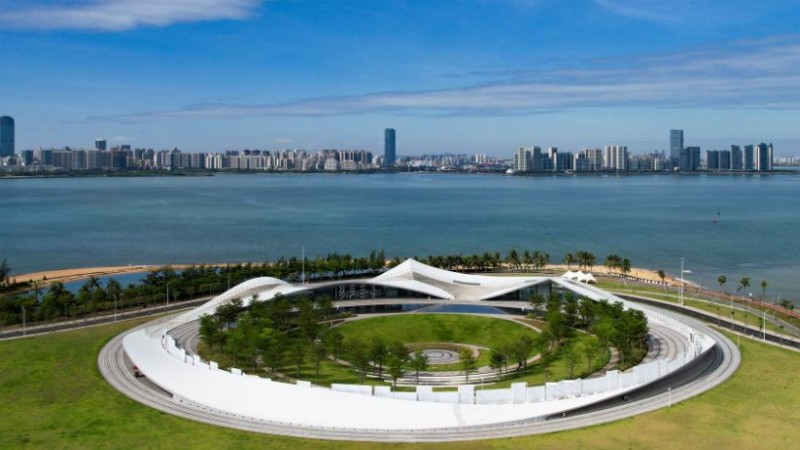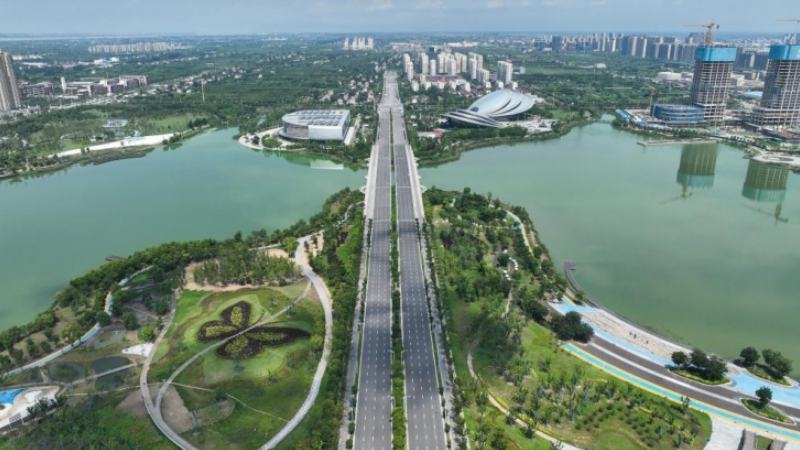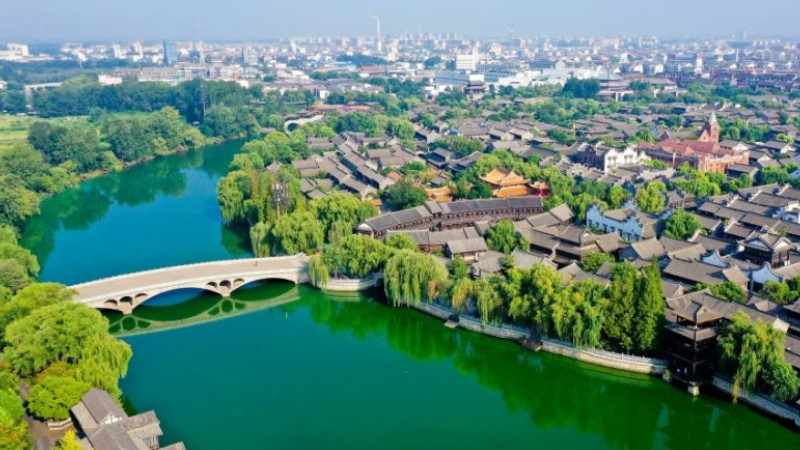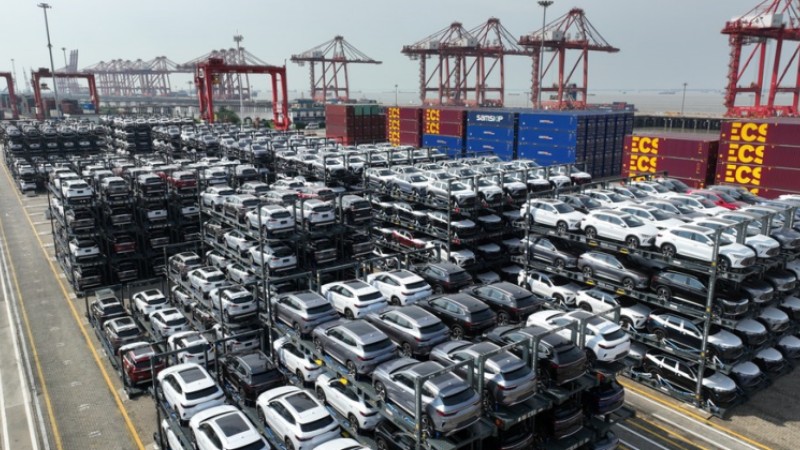Why Japanese militarism should raise alarm bells
TOKYO, Aug. 15 (Xinhua) -- The Japanese government's recent embrace of militarism has caused unrest among its citizens and raised alarm in the region and beyond. Concern is growing about the nation's failure to adequately address the atrocities committed during World War II.
On Aug. 15, 1945, the Japanese government announced its surrender in WWII. From the Nanjing Massacre to the appalling bacterial experiment of Unit 731 and the inhuman "Three Alls Policy," Japanese invaders committed monstrous atrocities in China decades ago.
However, the once ruthless invader has deliberately concealed its ugly history by repeatedly stressing its victimized role at atomic bombing memorial ceremonies, with some Japanese politicians publicly visiting the notorious Yasukuni Shrine dedicated to WWII Class-A war criminals.
Since last year, the Kishida government has modified its foreign policy by abandoning pacifism and embracing militarism. Analysts here have called for vigilance against such a move, urging the government to draw lessons from its past crimes as Japan marks the 78th anniversary of its surrender in WWII.
BREAKING POST-WAR TABOOS
Since WWII ended, right-wing forces in Japan have never given up their dreams of becoming a "politically major nation" and a "great military power." But war-renouncing Article 9 of the Japanese Constitution kept them at bay with one clause, among others, stating that the country would "forever renounce war as a sovereign right of the nation and the threat or use of force as means of settling international disputes," resulting in an exclusively defense-oriented policy.
However, since the end of last year, the government led by Prime Minister Fumio Kishida has broken many taboos by ignoring the pacifist constitution and lifting military bans.
In updating three security and defense-related documents, including the National Security Strategy, Japan has sought to gain "enemy base strike capabilities" to break through the constitution's constraints and exclusively defense-oriented commitments, significantly changing its post-war security policies.
The Kishida government also decided to substantially increase defense spending to expand the military, aiming to increase defense spending annually to around 2 percent of gross domestic products by fiscal 2027, breaking the post-war convention of no more than 1 percent.
The revised documents further lifted post-war military bans, including a further relaxation of the Three Principles on Defense Equipment Transfers, which was already relaxed during Shinzo Abe's administration, to expand the export of weapons.
Multiple signs of Japan's military expansion and preparations for war have triggered criticism and concern among the Japanese public.
Atsushi Koketsu, emeritus professor at Yamaguchi University of Japan, told Xinhua that the updated three documents would aggravate the tension between Japan and its Asian neighbors. At the same time, a local anti-war peace organization stated that the documents would make Japan a country capable of waging war once again, thus inciting a dangerous arms race in East Asia.
UPGRADING ALLIANCE WITH U.S., NATO
In recent years, the United States has led in building a so-called "quadrilateral mechanism" consisting of the United States, Japan, India and Australia in the Asia-Pacific region and forming cabals that incite confrontation.
Since taking office, the Kishida government has been bent on pleasing the United States by serving as the latter's vanguard in the Asia-Pacific region. The revised security documents upgraded the Japan-U.S. military alliance by switching to attack mode. Japan will purchase and install many Tomahawk cruise missiles from the U.S. over the next five years and develop high-speed gliding missiles.
Kishida's government has also actively expanded multilateral military cooperation. In addition to cooperating with the U.S. to build the Quad and other regional alliances, Japan has also colluded with NATO countries to intervene in Asia-Pacific affairs, including holding joint military exercises with NATO countries in the region, with Kishida himself twice attending NATO summits.
At the NATO summit in July this year, Japan and NATO agreed to upgrade their military cooperation to include cyber defense, coping with emerging technological challenges such as artificial intelligence and space security. However, NATO's proposal to set up a liaison office in Japan, which aroused much attention, was not passed because of opposition from France and other nations.
Many Japanese people strongly opposed Kishida's trip to the NATO summit, condemning NATO as a war bloc that would only threaten world peace. According to protesters, the frequent interaction between the Kishida government and NATO would bring war to the Asia-Pacific.
Japan's moves in approaching NATO and creating tensions in Asia violated its commitment to China when the two countries concluded a treaty of peace and friendship 45 years ago, said Koketsu.
INCITING TENSIONS WITH "TAIWAN CONTINGENCY"
Japanese politicians have adopted the United States' strategy of "using Taiwan to contain China" and deliberately meddling in the Taiwan question. Vice President of the Liberal Democratic Party and former Prime Minister of Japan Taro Aso visited China's Taiwan region this month to hype up cross-Strait tensions and blatantly interfere in China's internal affairs.
Aso's unwarranted remarks have been strongly criticized. Kazuteru Saionji, a visiting professor at Higashi Nippon International University, said that Aso's actions are blatantly hostile to China and violate the war-renouncing Article 9 of the Japanese Constitution, the Japan-China Joint Statement and the Japan-China Treaty of Peace and Friendship, undermining the peace and stability in Northeast Asia.
The Taiwan question is another country's internal affairs, said Yuki Izumikawa, a research fellow from Okinawa International University, adding that Aso's defending Taiwan's Democratic Progressive Party authorities and his irresponsible remarks could involve Okinawa in a war.
In recent years, the Japanese government has stepped up efforts to build the remote southwestern islands, including Okinawa Prefecture, into military fortresses. In March this year, Japan's Ground Self-Defense Force established a base on Ishigaki Island and deployed troops and missile units, claiming to fill a long-standing defense gap. The new base is the fourth in the southwestern islands established off the main island of Okinawa, with the other three on Kagoshima Prefecture's Amami-Oshima Island and the islands of Miyako and Yonaguni in Okinawa Prefecture.
In addition, according to a draft joint operation plan between the U.S. military and Japan's Self-Defense Forces revealed in December 2021, in the event of a so-called "Taiwan contingency," the U.S. will set up an attack base on the southwestern islands with Japan's support, with about 40 candidate sites.
The above actions have been met with strong opposition from the residents of Okinawa, who criticize the Japanese government for overstretching its defenses and military. They are concerned that Okinawa may once again become a battlefield.
In a peace declaration issued in June at the memorial service for the victims of the Battle of Okinawa in World War II, Okinawa Governor Denny Tamaki said that the military buildup on Okinawa has caused anxiety among local people who have profound memories of the war. He urged the Japanese government to ease regional tensions through dialogue.
"These things are creating a great deal of anxiety among the people of the prefecture," Tamaki said. "This situation calls for peaceful diplomacy through dialogue."
Photos
Related Stories
- Japanese PM sends offering to notorious war-linked Yasukuni Shrine
- S. Korean fishing boats stage rally against Japan's radioactive wastewater discharge plan
- People in South Korea protest against Japan's plan to discharge nuclear-contaminated wastewater into sea
- China calls for revisiting spirit of Treaty of Peace and Friendship Between China and Japan
- Leaks found in hose to transfer Fukushima nuclear-contaminated wastewater
Copyright © 2023 People's Daily Online. All Rights Reserved.









